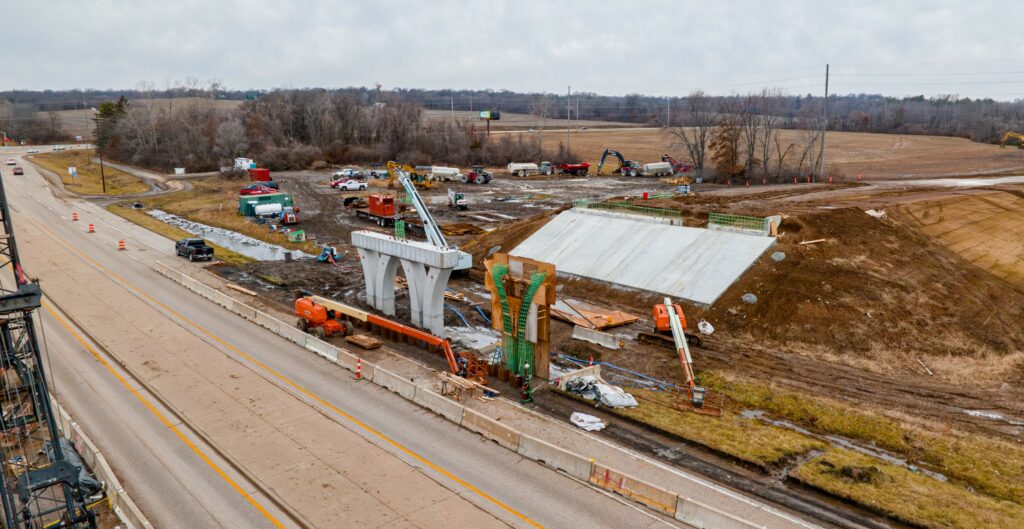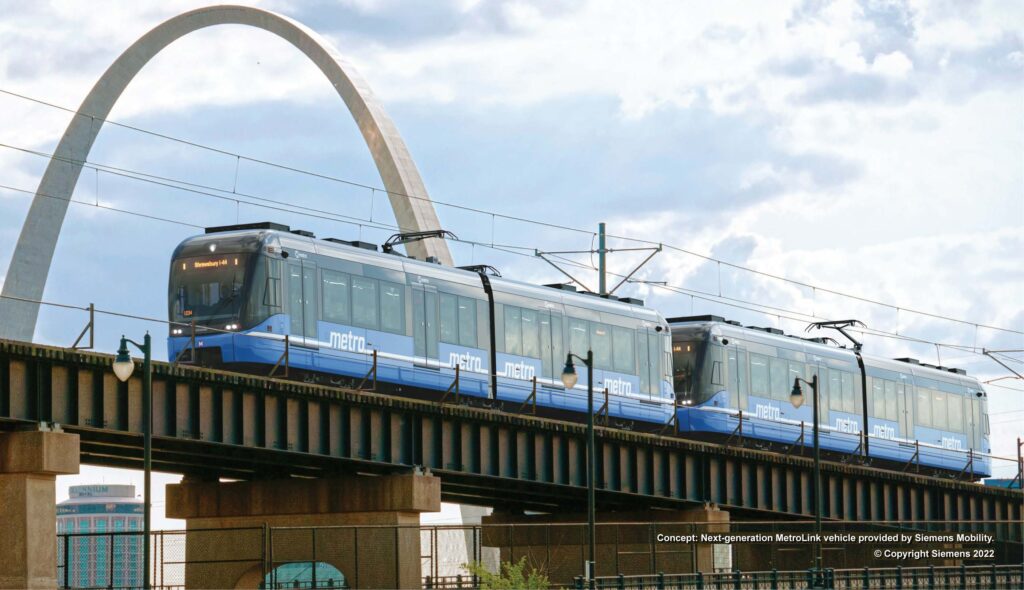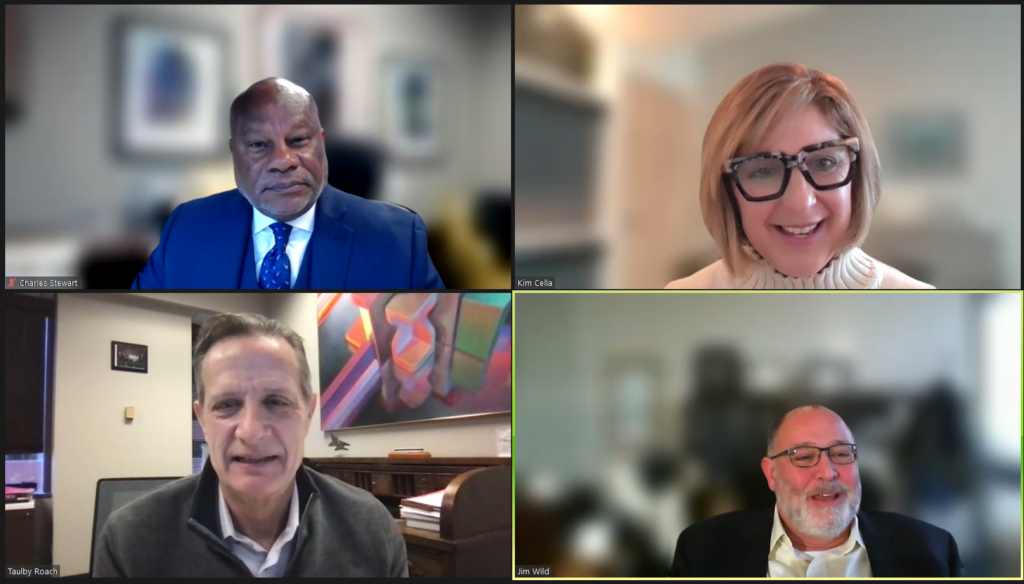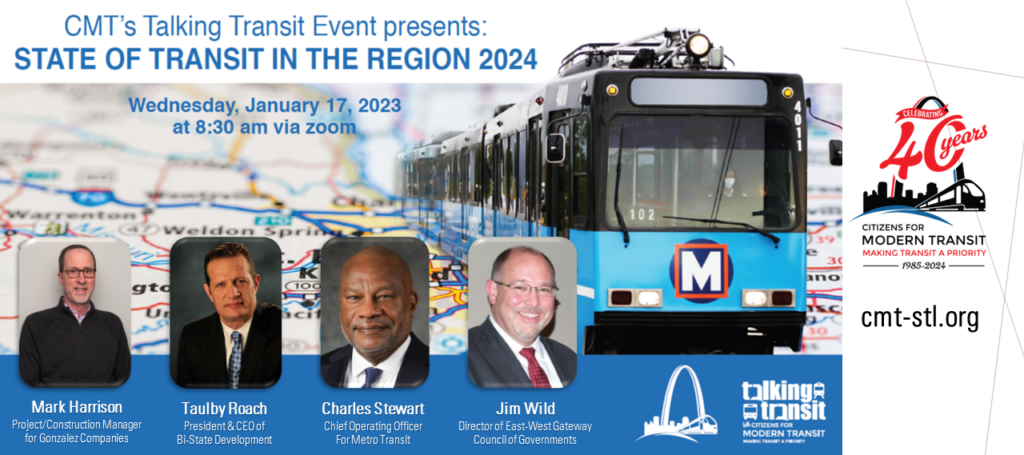The trajectory of public transit in the bi-state region was discussed today during Citizens for Modern Transit’s (CMT) “Talking Transit” event, hosted via Zoom. More than 120 CMT members, elected officials, stakeholders, transit riders and others attended the virtual forum to learn the latest about the MetroLink expansion to MidAmerica St. Louis Airport that is currently underway, the Northside-Southside Corridor Plan with St. Louis City and St. Louis County, Metro Transit’s operating plans and safety and security updates, the federal funding landscape and more.
The panel discussion featured Mark Harrison, Project/Construction Manager for Gonzalez Companies, which was hired by St. Clair County Transit District for the light rail expansion to MidAmerica St. Louis Airport; Taulby Roach, President and CEO of Bi-State Development; Charles Stewart, Chief Operating Officer for Metro Transit; and Jim Wild, Director of East-West Gateway Council of Governments. It was moderated by Kimberly Cella, Executive Director of Citizens for Modern Transit.
 Harrison kicked off the conversation by detailing the significant movement made on the 5.2-mile extension of the MetroLink light rail system from the existing Shiloh-Scott Transit Center to MidAmerica St. Louis Airport in Mascoutah. As part of the project, a new MetroLink station will be constructed directly across from the passenger terminal and parking lot on Airport Boulevard. Plans also include a 0.3-mile extension of Rieder Road from Wherry Road to Scott Air Force Base’s Cardinal Creek Gate that will provide more direct access; a new 2.4-mile access roadway that extends from Rieder Road to Airport Boulevard, offering a secondary entryway into the airport; and a 5-mile expansion of the MetroBikeLink System, which is a network of paved trails and bike paths that runs adjacent to MetroLink in St. Clair County. The new trail segment will run parallel to the alignment from the existing bike path at Shiloh-Scott Transit Center to MidAmerica St. Louis Airport. This multimodal project is being designed, bid and constructed as part of six different packages. There is a high-level of participation by disadvantaged business enterprises (DBEs) and a very large majority of contracts have been awarded locally – helping to pump money committed for this project back into the local economy. Construction is underway and is scheduled to be completed in the winter of 2025, followed by MetroLink testing on the new section of rail, with the station expected to open in late spring 2026.
Harrison kicked off the conversation by detailing the significant movement made on the 5.2-mile extension of the MetroLink light rail system from the existing Shiloh-Scott Transit Center to MidAmerica St. Louis Airport in Mascoutah. As part of the project, a new MetroLink station will be constructed directly across from the passenger terminal and parking lot on Airport Boulevard. Plans also include a 0.3-mile extension of Rieder Road from Wherry Road to Scott Air Force Base’s Cardinal Creek Gate that will provide more direct access; a new 2.4-mile access roadway that extends from Rieder Road to Airport Boulevard, offering a secondary entryway into the airport; and a 5-mile expansion of the MetroBikeLink System, which is a network of paved trails and bike paths that runs adjacent to MetroLink in St. Clair County. The new trail segment will run parallel to the alignment from the existing bike path at Shiloh-Scott Transit Center to MidAmerica St. Louis Airport. This multimodal project is being designed, bid and constructed as part of six different packages. There is a high-level of participation by disadvantaged business enterprises (DBEs) and a very large majority of contracts have been awarded locally – helping to pump money committed for this project back into the local economy. Construction is underway and is scheduled to be completed in the winter of 2025, followed by MetroLink testing on the new section of rail, with the station expected to open in late spring 2026.
 Roach addressed the MetroLink Northside-Southside Corridor Plan led by St. Louis City and St. Louis County, providing an updated overview of the Jefferson Avenue Alignment and the North St. Louis County Community Connector. This 5.6-mile MetroLink expansion project features a new alignment from Chippewa Street to the south, along Jefferson Avenue, all the way up to Natural Bridge to the north. According to Roach, the City of St. Louis portion of the project is at 15 percent design completion right now and moving toward 30 percent with HNTB, the project management consultant, looking at station locations in order to provide a highly competitive application for federal funds and move into the project development stage this year. Meanwhile, St. Louis County is reviewing alternatives analysis for several different corridor options in conjunction with engineering consultant AECOM to identify the most impactful area to build. Both projects will be transformational for the region.
Roach addressed the MetroLink Northside-Southside Corridor Plan led by St. Louis City and St. Louis County, providing an updated overview of the Jefferson Avenue Alignment and the North St. Louis County Community Connector. This 5.6-mile MetroLink expansion project features a new alignment from Chippewa Street to the south, along Jefferson Avenue, all the way up to Natural Bridge to the north. According to Roach, the City of St. Louis portion of the project is at 15 percent design completion right now and moving toward 30 percent with HNTB, the project management consultant, looking at station locations in order to provide a highly competitive application for federal funds and move into the project development stage this year. Meanwhile, St. Louis County is reviewing alternatives analysis for several different corridor options in conjunction with engineering consultant AECOM to identify the most impactful area to build. Both projects will be transformational for the region.
Stewart continued the conversation by providing an update on all that has been accomplished by Metro Transit from an operational standpoint. Over the past six months, Metro Transit has obtained 123 new MetroBus and 88 new Metro Call-A-Ride operators, instituted a $5,000 sign-on bonus to attract team members and updated training and mentor programs. As a result, Metro Transit has been able to make a special service change this month to implement increased frequency on 17 MetroBus routes in Missouri. This includes taking eight routes from 120 minutes in length down to 60 minutes and nine routes from 60 minutes in length to 30 minutes. Stewart says this is a trend he expects to continue to see in 2024 as the transit agency gets additional operators hired. The next quarterly service change is set for March 18.
On the safety and security front, the Secure Platform Plan continues to move forward. According to Roach, the Real Time Camera Center, which is at the core of the project, is fully operational. It features a Closed-Circuit Television system that enables the St. Louis County and St. Louis Metropolitan Police Departments and St. Clair County Sherrif’s Office to proactively monitor the MetroLink system 24 hours a day, seven days a week. The first package of a phased implementation approach for the installation of gates and fencing is in progress at four MetroLink stations in Illinois.
 Wild rounded out the Talking Transit forum by addressing federal funding. The Infrastructure Investment and Jobs Act – a $1.2 trillion investment to rebuild the nation’s water, road, transit, and broadband systems, grow our economy, and create good-paying jobs – is at its midpoint. A total of $108 billion was allocated for transit. This includes $4.6 billion available nationally per year for light rail and other types of projects, and a total of 59 projects have already been submitted for consideration in the categories of new-starts, small-starts or core capacity funds. The Northside-Southside project will be competing for funding directly against 20 other new-starts projects that have already begun the project development process. The typical federal match for a new-start project is 50:50, meaning 50 percent would come from federal funds, and 50 percent would need to come from some mix of state, local and private investments. The funding environment is very competitive, and local leaders are working very hard to compile the best possible applications for consideration, according to Wild.
Wild rounded out the Talking Transit forum by addressing federal funding. The Infrastructure Investment and Jobs Act – a $1.2 trillion investment to rebuild the nation’s water, road, transit, and broadband systems, grow our economy, and create good-paying jobs – is at its midpoint. A total of $108 billion was allocated for transit. This includes $4.6 billion available nationally per year for light rail and other types of projects, and a total of 59 projects have already been submitted for consideration in the categories of new-starts, small-starts or core capacity funds. The Northside-Southside project will be competing for funding directly against 20 other new-starts projects that have already begun the project development process. The typical federal match for a new-start project is 50:50, meaning 50 percent would come from federal funds, and 50 percent would need to come from some mix of state, local and private investments. The funding environment is very competitive, and local leaders are working very hard to compile the best possible applications for consideration, according to Wild.
“This was a very real and transparent update on the state of transit in our region,” commented Cella. “After each panelist presented, the forum was opened for attendees to ask questions via the chat feature. I encourage those unable to attend to visit Citizens for Modern Transit’s website to access the 60-minute forum. It was extremely insightful and provided a wealth of information beyond this summary.”
CMT hosts quarterly “Talking Transit” events to keep members, elected officials, stakeholders, transit riders and others in the loop on issues and efforts influencing the local transit system. These educational gatherings feature guest speakers and panel discussions addressing a wide range of topics, including transit-oriented development, safety and security, best practices, service changes and more.
A recording of the event is available via CMT’s YouTube channel below:
